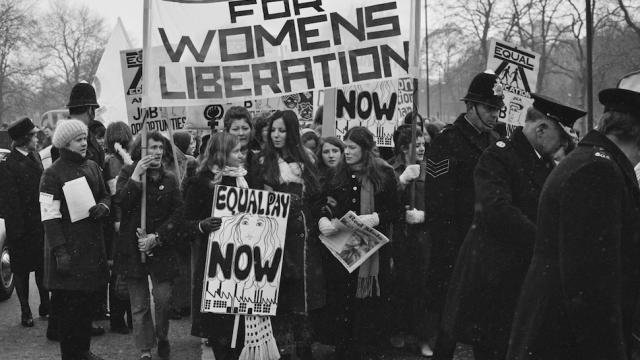Today is Equal Pay Day in the US, which is so chosen because it marks, on average, how much longer a woman would have to work to make the same as a man did during the previous year. Women across the US are… well, not quite “celebrating”, but marking the day with events and protests, and probably more than a few private grievances about their overpaid male colleagues and bosses. But while the pay gap pervades most occupations, it’s often particularly pronounced at higher income levels — which many jobs in tech are.
Image: Getty
In fact, Equal Pay Day serves as a good — and by “good” we mean distressing, sad and lonely — reminder of how difficult it is to be a woman working in the tech industry, even besides the economics.
First, the pay gap itself. While it isn’t as bad as in other occupations — even other high-compensation jobs, like medicine — there are still problems, particularly for certain demographics. According to the tech job website Hired, while white women in tech earn $US0.90 for every $US1 a white man earns, black women earn just $0.79. Younger women reportedly face a much bigger gap than older women in tech, too.
But that, of course, only happens if they can get a job in the first place. Women are vastly underrepresented in tech jobs, particularly at higher levels. According to a LinkedIn study released last week using the site’s own salary data, among the highest-paying jobs in America, women make up far less than half of leadership roles, and that’s especially true of tech jobs. The top three roles where women are most underrepresented — chief technology officer, vice president of engineering, and director of system engineering — are all tech roles, and six of the 10 jobs with the lowest proportions of women are tech jobs.
Venture capital — the toxic sludge that runs through the veins of Silicon Valley Joe — has the same problems. According to a recent analysis from the news site Axios, women make up just seven per cent of decision-makers at venture capital firms. And it’s the same in cybersecurity: A study released last month by the Center for Cyber Safety & Education found that women make up just 11 per cent of cybersecurity roles.
Unsurprisingly, many of those big-name, venture-funded companies aren’t doing great. Uber, which finally released its diversity numbers last month, has about 29 per cent women workers, but women hold only 15 per cent of the tech jobs there. And it isn’t much better at other companies — women make up 30 per cent of jobs at Apple, 29 per cent at Google, and just 25 per cent at Microsoft, according to those companies’ 2016 data.
The problems don’t end when the offer letter comes, either. It isn’t just about hiring women, or publishing a nice diversity report, or saying, “We’re trying.” It’s about retaining those women, which means creating a culture where women actually want to work, and where they thrive. And there are countless stories of Silicon Valley failing abysmally at that. Allegations of endemic sexual harassment and general dickishness towards women at Uber made a splash last month — and, in the past, Squarespace, Github and Tinder, to name a few — but it’s not just them. Elephant in the Valley, a 2015 study of 200 women in tech with at least 10 years’ experience, found that 60 per cent of respondents had received unwanted sexual advances, and 60 per cent of women who reported harassment were dissatisfied with their company’s response.
And if you share your concerns, you risk getting shot down. Many men in tech don’t even see the problems. (Rose-coloured glasses sure are nice!) If you call out sexism publicly, you risk getting fired or dismissed outright.
Of course, Not All Women feel this way. It’s not like every woman in tech is dodging groping hands on the way to the water cooler in between being turned down for a raise and being asked to order the cake for birthdays. In fact, after the recent Uber sexism allegations surfaced, one female engineer wrote on LinkedIn that Uber wasn’t sexist, but instead had a pro-“hustling” culture of “type-A” individuals.
But the numbers confirm what most women know to be true — our G-chatted suspicions about male colleagues’ higher pay, our shared eye-rolls during meetings. It’s true in tech, it’s true in most industries, and it blows. It’s so draining, and it often feels impossible to even ask to be paid what you’re worth. But you gotta try.
